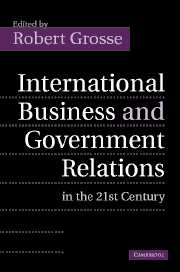Book contents
- Frontmatter
- Contents
- List of figures
- List of tables
- List of contributors
- Acknowledgments
- Introduction
- Part I History and theories of analysis of international business–government relations
- Part II The shifting international business–government partnership
- Part III Bargaining theory and the obsolescing bargain
- Part IV Host and home government views of international business
- 14 Global regulatory convergence: the case of intellectual property rights
- 15 Regional multinationals and government policy: the end of global strategy and multilateralism
- 16 How will third world countries welcome foreign direct investment in the twenty-first century?
- 17 Assessing government policies for business competitiveness in emerging market economies: an institutional approach
- 18 Protecting foreign investors in the developing world: a shift in US policy in the 1990s?
- Conclusions
- References
- Select bibliography of J. N. Behrman's works
- Index
14 - Global regulatory convergence: the case of intellectual property rights
Published online by Cambridge University Press: 22 September 2009
- Frontmatter
- Contents
- List of figures
- List of tables
- List of contributors
- Acknowledgments
- Introduction
- Part I History and theories of analysis of international business–government relations
- Part II The shifting international business–government partnership
- Part III Bargaining theory and the obsolescing bargain
- Part IV Host and home government views of international business
- 14 Global regulatory convergence: the case of intellectual property rights
- 15 Regional multinationals and government policy: the end of global strategy and multilateralism
- 16 How will third world countries welcome foreign direct investment in the twenty-first century?
- 17 Assessing government policies for business competitiveness in emerging market economies: an institutional approach
- 18 Protecting foreign investors in the developing world: a shift in US policy in the 1990s?
- Conclusions
- References
- Select bibliography of J. N. Behrman's works
- Index
Summary
Introduction
Multinational corporations manage relations with governments at different levels – in the home country, at the regional (supranational) level, in host countries, and, from time to time, in a coordinated fashion at the global level (see figure 14.1). The IB literature is quite extensive on MNC relations with host governments but relatively thin on how MNCs manage government relations globally (e.g., Mahini, 1988), even though MNCs have become much more proactive at working through home and host governments to change the context of control, rather than just working within a given context (e.g., see Ramamurti, 2001). In this paper, I focus on one such area, intellectual property (IP) rights, and analyze how one MNC, Pfizer, worked to change the global regulatory environment. Influencing public policy at the global level is for MNCs the ultimate challenge in business–government relations. With global economic interdependence growing, there are stronger incentives for MNCs to seek harmonized global regulations in international trade and investment, and in fields such as accounting, corporate governance, health and safety, and anti-trust.
MNCs pursue global strategies and operate in global industries but the regulations governing their operations are often national or regional in scope. Regulatory heterogeneity demands matching complexity in MNCs' strategies and operations. Just as convergence in tastes worldwide creates opportunities for MNCs to produce globally standardized products, so too convergence of regulations allows MNCs to adopt globally standardized methods of operation, which can lower costs and reduce policy uncertainty.
- Type
- Chapter
- Information
- Publisher: Cambridge University PressPrint publication year: 2005
- 4
- Cited by



